-
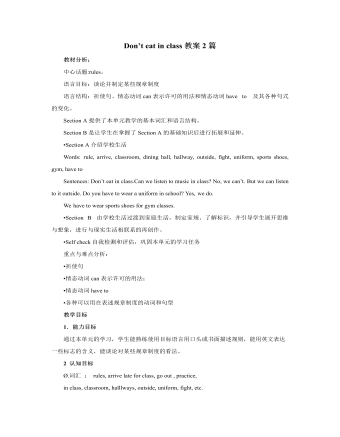
人教版新目标初中英语七年级下册Don’t eat in class教案2篇
Don’t fight. =You can’t fight. (板书,教读)教师把这些句子板书在黑板上,并请学生大声整齐地读祈使句和“can’t”句型,并让学生注意两种句型表达形式的不同和转换,“Don’t …=You can’t…”;并对学生说:These are our school rules. (板书,教读) You can’t break the school rules. Don’t break the school rules.(板书,教读)步骤3 :Practicea. T: Now, each of the students is breaking one of these rules.Please finish 1a.学生看图,完成1a的内容,检查答案并大声朗读校规。b. 听录音,完成1b,选出四位学生都违反了哪条校规;听之前,学生要读会英文名。c. 请两位学生朗读1c部分的句型;要求学生两人一组对话表演,SA扮演外校转来新生,SB告知本校校规。(学生可经过讨论,多说出他们想到的校规,不必只限于书上;教师应给予帮助)2) 第二课时(2a~4)步骤1 :warming up of revisionT: What are the rules at your school?学生使用“can”或祈使句表达各条校规;其中老师可引出“eat in the cafeteria outside”的表达。步骤2 :Practicea.T: Christina is an exchange student. She doesn’t know the rules. Let’s listen, what activities they’re talking about?学生听第一遍时,完成2a;第二遍时,完成2b;b. 请学生领读2c部分,看着2a完成的表格,理解2c活动的要求;分成小组针对2a进行问答;
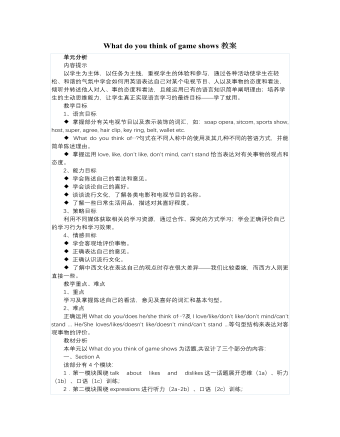
人教版新目标初中英语七年级下册What do you think of game shows教案
五、教学Section B-2c1. Pair work: What do you think of the belt/sunglasses/…? What does your father/mother/… think of your scarf/belt…?2. Group work(1). Teacher shows some different kinds of school uniforms (制服)and asks : “ What do you think of your school uniforms? If you have a chance to choose your school uniforms, what kind would you like to choose?”(2). Discuss in groups.(3).Get some Ss to report in class.说明:这一步旨在让学生运用已有的语言知识谈论对事物的看法和意见,并简单阐明理由,培养学生的主动思维能力和运用英语的能力。六、教学拓展调查电视节目的收视率任务:调查你周围的人对现在各种电视节目的反响。活动过程:1.教师布置任务,让学生调查周围的人(包括他的亲戚朋友和邻居)喜欢收看哪方面的电视节目。2.学生进行调查活动,运用本单元所学的句型What do you think of….? (Why?)What's your favorite game shows?What do you think of talk show?I doesn’t mind it.I like it.I love it.I can’t stand it.3.记录下排在前10位的TV Program,填写调查表,比较其收视率。

人教版新目标初中英语八年级上册Can you come to my party教案3篇
Step 3 (3b)First, tell the students when we talk about our future plans, we often use: I’m+verb+ing When we talk about what we must do, we use have to. Ask the students to fill in the blanks in 3b. The answers are: shopping, go to see, a test, I’m going, my family. Step 4 (3c)Let the students write an e-mail message to a friend. Say why you can’t visit next. Before the exercise, ask the students to give some possible answers and write them on the blackboard. So the students will feel easy to finish the writing exercise. After they finish it, Let them to correct it in groups first. Each group chooses theirs best one to read in front of the whole class. Step 5 ( planning a party )First read the conversation in the box together. Then ask the students to turn to page 88.Write down everything you have to do next week. Write in all the things you have to do . Ask the students to look at the list. Ask them “What day are you free?” This is when you can have your party. Step 6 (Self check 1 )Let the students to fill in the blanks with the words given. Change the forms of the words if possible. Then make their own sentences. The answers are: visit, playing, have to, study, comeStep 7 (Self check 2)Imagine you are Marie. Read the information and look at your schedule. Write replies to the invitation.

人教版新目标初中英语八年级上册Could you please clean your room教案3篇
一、 教学内容Section A 1a----1c二、 教学目标1.学习词汇do the dishes, make the bed, take out the trash, fold the clothes, do the laundry, sweep the floor, clean the living room.2.句型 Could you please clean your room? Yes, sure.三、 教学准备 学生预习本单元所有的词汇多媒体课件 活动表 奖品四、 教学过程Pre-task1. Warming upEnjoy ourselves. Watch cartoon Cinderella. 看动画片段《灰姑娘》导如入本课话题和新词汇“chores”美丽善良的鬼姑娘因继母的嫉妒,每天得做所有的家务。片段的主题使学生联想到本课的话题。2. learn new words and phrasesLook! What is she / he dong? 看图学习动词词组do chores, do the dishes, make the bed, take out the trash, fold the clothes, do the laundry, clean the living room.3. Guessing game.What is she doing ? 4. Pair work. 1a, Do you do these things at home? Write “Y” for “yes” and “N” for “no”.5. Listening . 1b , Peter’s chores or Mom’s chores?理解目标语Could you please clean your room? Yes, sure.Write “M” for Mom’s chores, “P” for Peter’s chores in the chart.6. PairworkLook at the picture,Ask your partner to do the chores that you see. 7. Interview Who is the most able at home? 1) What chores do you do at home? How often do you do the chores? Work in four, interview each of the students in the group, fill in the chart.
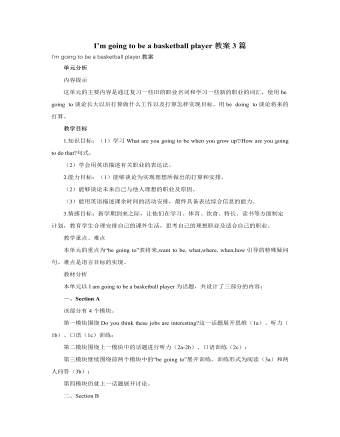
人教版新目标初中英语八年级上册I’m going to be a basketball player教案3篇
教学目标1.知识目标:(1)学习What are you going to be when you grow up?/How are you going to do that?句式。(2)学会用英语描述有关职业的表达法。2.能力目标:(1)能够谈论为实现理想所做出的打算和安排。(2)能够谈论未来自己与他人理想的职业及原因。(3)能用英语描述课余时间的活动安排,最终具备表达综合信息的能力。3.情感目标:新学期到来之际,让他们在学习、体育、饮食、特长、读书等方面制定计划,教育学生合理安排自己的课外生活,思考自己的理想职业及适合自己的职业。教学重点、难点本单元的重点为“be going to”表将来,want to be, what,where, when,how引导的特殊疑问句。难点是语言目标的实现。教材分析本单元以I am going to be a basketball player为话题,共设计了三部分的内容:一、Section A该部分有4个模块。第一模块围绕Do you think these jobs are interesting?这一话题展开思维(1a)、听力(1b)、口语(1c)训练;
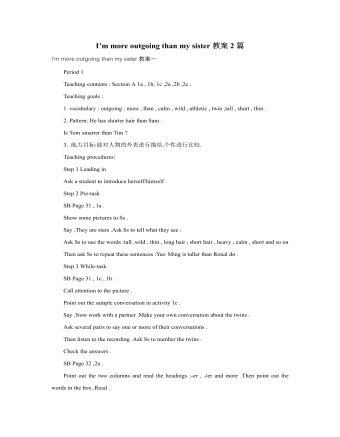
人教版新目标初中英语八年级上册I’m more outgoing than my sister教案2篇
1 交通工具的比较此活动为小组活动。学生通过讨论找出到达某一城市可乘坐的各种交通工具,并选择最佳出行方式。Teacher:We’re going to Shanghai. How many ways can we use to get there? Yes, there are four ways: by bus, by plane, by train, by ship. Please discuss how you are going to get there.操作建议:(1)学生以小组为单位展开活动,谈论本组所选择的交通工具。(2)各组选代表向全班汇报,阐述本组所选择的交通工具的利和弊。完成任务所需要的语言结构:We can go there by ship. It’s more comfortable and cheaper than any other transportation.We can go there by bus. It’s cheaper but it takes longer time.2 哪个城市更合适?此活动具有挑战性。假设中国要举行2014年世界杯足球赛,分别从历史,人文,天气等方面对各城市(北京,大连,上海,昆明)进行比较,选择最佳举办城市。T: Imagine China is holding the 2014 FIFA World Cup. Which city do you think is the best for the World Cup, Beijing, Dalian, Shanghai or Kunming? Let’s work in groups. If you choose Beijing, please join the Team Red. If you chose Dalian, please join the Team White. If you choose Shanghai, please join the Team Blue. If you choose Kunming, please join the Team Green. Please show us its advantages. Then let’s see which team will win.

人教版新目标初中英语八年级下册He said I was hard-working教案2篇
This activity introduces some new vocabulary and provide oral practice using the target language.Task 1 . Ask four students to stand in front of the class, and the teacher asks them the following questions as a reporter.1.What are you going to do when you grow up?2.What are you going to do next week?3.What are going to do after school?The students will give different answers, then ask a good student to report what they said.I am going to e a doctor.What did she say?----------She said she was going to be a doctor.I am going to have a party on Friday night.What did he say?-------He said he was going to have a party on Friday night.I am going to do my homework.What did she say ?------ She said she was going to do her homework.I am going home after school.What did she say?-----She said she was going home after school.Say In this unit we are going to learn to use words like to report what someone said.Task 2. Read the instructions. Then ask a student to read the four questions. And write the words on the Bb. Explain what soap opera is.Task 3. Ask the students to Look at the pictures, point out the TV screens in the picture. Ask one girl to read what Marcia said.What did Marcia say? She said She said she was having a surprise party for Lana on Friday night. Repeat the other pictures in the same way.Activity3. Listen and number the pictures in activity 1a.
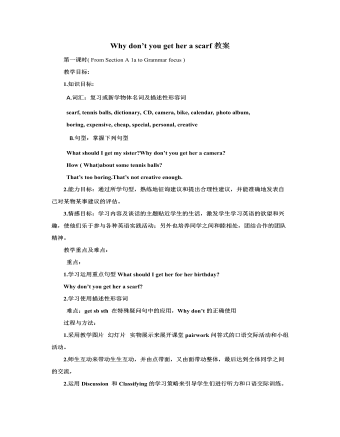
人教版新目标初中英语八年级下册Why don’t you get her a scarf教案
教师带领学生复习有关描述宠物的词汇,采用教师提问学生回答的方进行。如:T:What animals do you think would be good pets?What animals do you think would be bad pets?What do you think are good animals for a six-year-old child?然后学生进行 pairwork 练习。Task two: 师生互动,学习探究 1、播放3a部分的录音,引导学生一边听录音,一边跟读。2、通过听录音学生回答以下问题:Why do you think pot-bellied pigs are popular?What are the advantages and disadvantages of keeping such a pet?教师对学生的回答进行及时点评。3.学习范文,学习重点短语,为下步的模仿写作提供语言素材。T :1. )Have you ever kept a pig as a pet?Do you like pigs? St.:No.…Why don’t you like to keep a pig? St: No.They’re too dirty and lazy(Do you know in some foreign countries like Hollyland, Australia,pigs are the most popular pet.there’s a kind of pig.(图)it has an interesting name? it ‘s called a pot-bellied pig.) Now,let’s learn an article about this kind of interesting pet.2.)play the tapeSt.:Listen and repeat3.)show some Qs on computer(本子St.: read silently,then answerthe Qs(本子)4.)Ask ss. Close book and retell this passage.(what is a pot-bellied pig? Is it a good or bad pet? ) St.: retell it to each other“A pot –bellied pig is a popular pet now…”5.read the article together.St.:.practice reading
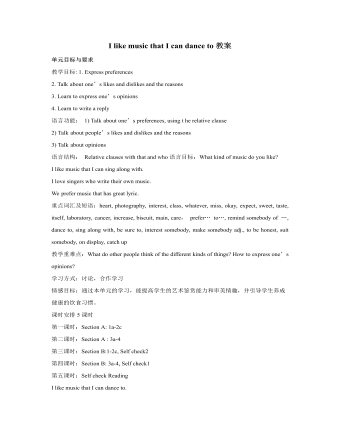
人教版新目标初中英语九年级上册I like music that I can dance to教案
教学目标: 1. Express preferences2. Talk about one’s likes and dislikes and the reasons3. Learn to express one’s opinions 4. Learn to write a reply 语言功能: 1) Talk about one’s preferences, using t he relative clause2) Talk about people’s likes and dislikes and the reasons3) Talk about opinions语言结构: Relative clauses with that and who语言目标:What kind of music do you like?I like music that I can sing along with.I love singers who write their own music.We prefer music that has great lyric.重点词汇及短语:heart, photography, interest, class, whatever, miss, okay, expect, sweet, taste, itself, laboratory, cancer, increase, biscuit, main, care, prefer… to…, remind somebody of …, dance to, sing along with, be sure to, interest somebody, make somebody adj., to be honest, suit somebody, on display, catch up教学重难点:What do other people think of the different kinds of things? How to express one’s opinions? 学习方式:讨论,合作学习情感目标:通过本单元的学习,能提高学生的艺术鉴赏能力和审美情趣,并引导学生养成健康的饮食习惯。课时安排5课时第一课时:Section A: 1a-2c第二课时:Section A : 3a-4第三课时:Section B:1-2c, Self check2第四课时:Section B: 3a-4, Self check1第五课时:Self check ReadingI like music that I can dance to.

人教版新目标初中英语九年级下册By the time I got outside, the bus had already left教案
Ⅰ. Teaching Aims and Demands1. Knowledge Objects(1) Key Vocabularyoversleep(2) Target LanguageWhat happened?I overslept. And by the time I got up, my brother had already gotten in the shower.2. Ability Objects(1) Teach the students to use the new words.(2) Train the students to narrate past events with the Past Perfect Tense.(3) Train the students' listening and speaking skills with the target language.3. Moral ObjectIt’s a good habit to go to bed early in the evening and get up early in the morning. So you’ll never be in a hurry in the morning.Ⅱ. Teaching Key Points1. Key Vocabularyoversleep2. Target LanguageNarrate past events with the Past Perfect TenseⅢ. Teaching Difficult Points1. Train the students to narrate past events with the Past Perfect Tense.2. Train the students to understand the target language in spoken conversation.Ⅳ. Teaching Methods1. Thinking of examples from the students' real lives.2. Making sentences by looking at the pictures.Ⅴ. Teaching AidA tape recorderⅥ. Teaching ProceduresStep I Revision1. Revise the language points in Unit 8.Ask some questions like this: What volunteer work would you like to do?Help the students to answer, I’d like to…/I love to…/I hope to2. Practice the dialogue in Activity 3c on page 62 again. Get students to role play the similar dialogues with the following.

人教版新目标初中英语九年级上册Where would you like to visit教案2篇
The First PeriodⅠ.Teaching Aims and DemandsKnowledge Objects(1) Key Vocabularytiring, educational, fascinating, thrilling, peaceful, exotic, trek, jungle, take it easy, explore, historic, site(2) Target LanguageWhere would you like to go on vacation?I’d like to trek through the jungle, because I like exciting vacations.2. Ability Objects(1)Train students to talk about places they would like to visit with the target language.(2)Train students to describe vacations with different adjectives.(3)Train students' listening skill.3. Moral Object,It′s more interesting to go on vacating somewhere instead of staying at home.Ⅱ. Teaching Key Points1. Key Vocabularytiring, educational, fascinating, thrilling, peaceful, exotic, trek, jungle, take it easy, explore, historic, site2. Target LanguageTalk about different places with the target language.Ⅲ. Teaching Difficult Points1. Describe vacations with different adjectives.2. Talk about different places with the target language.Ⅳ. Teaching Methods1. Teaching by illumination2. Teaching by doing chain drills3. Teaching by pairworkⅤ. Teaching Aids1. A tape recorder2. Some pictures of different places with famous views

人教版新目标初中英语九年级下册Rainy days make me sad教案
1. 教材分析本单元以how do things affect you?为话题, 从颜色、天气、音乐、广告、产品等方面谈论了外界事物如何影响人的心情。要求学生掌握表达某物或某事给人带来的感觉、看法或影响等。共设计了四个部分的内容:Section A 该部分有4个模块:第一模块围绕Which restaurant would you like to go to?这一话题展开思维(1a)、听力(1b)、口语(1c)训练;第二模块围绕How does music affect you? 进行听力(2a-2b)、口语训练(2c);第三模块继续围绕how do colors in the restaurant affect you这一话题展开训练,训练形式为阅读和问题体验(3a)和小组活动(3b);第四模块仍就How do things affect you这一话题以调查的形式展开讨论。Section B该部分有4个模块:第一模块围绕产品广告对人们的影响这一话题以“配对”(1a)与“列举”(1b)两种形式展开训练;第二模块继续围绕How do things affect you? 进行听力(2a-2b)、口语对话训练(2c);第三模块围绕“Advertising”这一话题展开阅读(3a-3b)和写作(3c)训练;第四模块围绕How posters affect you这一话题以口语训练形式展开小组活动。

人教版新目标初中英语九年级下册I’ll help clean up the city parks教案
Talk about offering help (P60)I’ll help clean up the city parks.A: I’d like to work ...B: You could help ...Talk about ways to tell people about the Clean-Up Day (P61)We need to ...We can’t ...I’ll ...Talk about the work the volunteers do (P62)These three students all volunteer their time to help other people.Somebody loves to ... / helps ... / plans to ... / wants to ...A: What do you like doing?B: I like ... A: What kind of volunteer work do you think I could do?B: You could ...1. 重点词汇advertisement, fix, repair, pleasure, blind, deaf, shut, carry, specially, fetch2. 认读词汇hunger, homeless, cheer, clean-up, sign, establish, major, commitment, elementary, veterinarian, coach, similar, call-in, strategy, disabled, organization, unable, support, appreciate, donation, part of speech, pronoun, adverb, preposition, conjunction, donate, Jimmy, Sally3. 词组clean up, cheer up, give out, put off, set up, think up, take after, fix up, give away, put up, hand out, work out, at once

人教版高中历史必修1古代希腊民主政治教案
二.运用思考题目,激发学生对本课问题的探究,检查学生在学习过程中,结合所学的知识,对问题的思考、质疑;从而学会查阅、搜集资料,分析、整理;通过讨论、交流,得出新的认识。学生可根据自己的实际情况和个人爱好,可选择不同的作业呈现方式,包括作业的问题的选择、缴交的方式(制作、小论文、课件)等等,从而体现学生对古代希腊雅典民主政治产生的条件、雅典民主政治的内容及其意义的认识的程度。1.“东西方不同政治制度选择的因素分析”(课前)2.古代雅典民主政治制度对人类文明的影响。(课后)七.反思与总结本课的设计在实施过程中,总体效果比较好,对课标的要求基本达至。尤其是通过东西方不同政治制度选择的对比,不但复习了旧的知识,而且加深了对新知识的掌握,从而有更深入的认识。学生在这个问题的学习过程中,通过课前自身的活动(搜集、查阅资料),逐步培养历史的学习的方法;在课堂上,同学们通过讨论的过程,互相交流、分享心得体会;逐步提高自己的思维能力。

人教版高中历史必修2第二次工业革命教案2篇
请回答:根据上述材料,概述第二次工业革命兴起的主要原因。〖参考答案〗①政治上,资本主义制度在世界范围内的确立,为第二次工业革命提供了政权保障。②市场上,世界市场进一步拓展,推动生产进步发展。③科技上,19世纪自然科学的飞速发展与重大突破。④劳动力上,拥有更多、素质更好的自由劳动力。⑤经济上,拥有更加雄厚的资本。探索攻关二:第二次工业革命与垄断组织的出现的关系材料一第二次工业革命产生的新兴工业部门,在厂房、设备、技术要求和产品结构的复杂性等方面,都对生产组织提出了新的要求。这是过去的独家企业无法满足的,而且一般没有足够的资金。……于是,集中资金的合股公司迅速增加起来,起大型企业垄断组织也就应运而生。
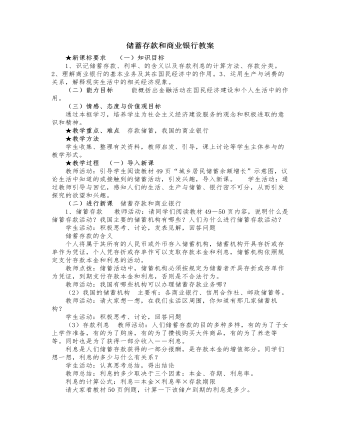
人教版高中政治必修1储蓄存款和商业银行教案
第三、结算业务结算业务时商业银行为社会经济活动中的货币收支提供手段与工具的服务。银行从中收取一定的服务费用。除上述三大业务外,商业银行还可以提供债券买卖与兑付、代理买卖外汇、代理保险、提供保管箱等其他服务。教师活动:商业银行在我国经济建设中具有巨大作用。请同学们看教材52页专家点评。学生活动:阅读课本,认真总结,得出结论(三)课堂总结、点评 这节课我们重点学习了储蓄存款和商业银行的有关知识,知道了储蓄存款活动程序、主要机构、特点和利息的计算等常识,了解了各种商业银行主要业务及其作用。这对于我们在日常生活中正确地办理金融储蓄业务将有重大指导作用。★课余作业 组织学生到附近银行、企业、居民中,咨询银行信贷活动的程序及原则要求,并亲自到商业银行办理一次存款和取款活动。
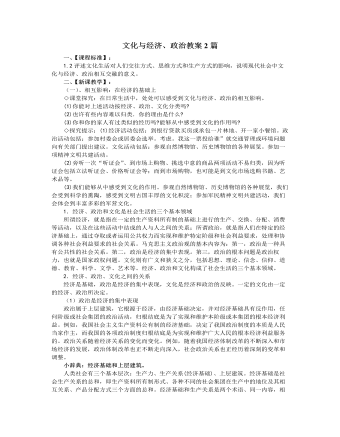
人教版高中政治必修3文化与经济、政治教案2篇
1.在激烈的国际竞争中,美国为首“巴统”在对中国出口高科技产品的问题上采取了种种限制措施,以避免西方发达国家的高科技技术和设备流人中国。面对发达国家的技术封锁,我们应该( )A.加速我国对外开放的步伐B.尽快改善与西方发达国家的关系C.努力提高自身的科技水平,增强本国的综合国力D.立足于自力更生,努力开发所有的高科技技术,以免受制于人答案:C解析:在当今和未来的世界,经济是基础,科技是龙头。因而,发展经济和科学技术是世界大多数国家最关心的问题。各国之间的竞争越来越多地转向经济和科技领域。各国都已经清楚地认识到,能否在科技发展上取得优势,增强以经;济和科技为基础的综合国力,最终将决定本国在国际上的地位。受各种主客观条件的限制,任何国家都不可能开发出自己所需要的所有技术,国家之间必须加强技术交流,互通有无,共同发展。“巴统”对我国进行技术出口方面的限制是基于其敌视中国的战略需要。为了打破西方国家的对我国的技术限制,我国必须从自身出发,提高自身的科技水平。

人教版高中政治必修3在文化生活中选择教案2篇
(二)“奥运福娃”探究1、“五福娃”体现了哪些精神?体现了“科技奥运、人文奥运和绿色奥运”的奥运精神也体现了“团结、奋进、爱好和平”的民族精神。2、“龙”是中华民族的图腾,我们自称是龙的传人,但北京奥运吉祥物里为什么没有“龙”?“龙”(dragon)在我国是美好的意思,例如龙凤呈祥,但在西方是魔鬼,很恐怖。北京奥运不仅是中国的奥运,更是世界的奥运,因此,福娃的原形中没有龙,这就是文化选择的结果。(三)感受先进文化1、交流自己最喜爱的文化。2、观看《千手观音》,谈观后感。(四)阳光下有阴影1、小品《电脑算命》2、课堂辩论正方:“烧香敬神”是封建迷信活动,不可取反方:“烧香敬神”是精神信仰活动,可取3、提高眼力,拒绝污染了解现实生活中的落后文化、腐朽文化,自觉抵制社会中落后文化、腐朽文化的毒害。
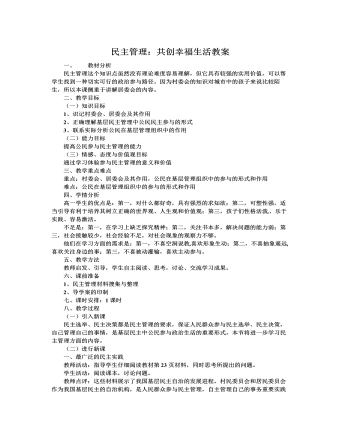
人教版高中政治必修2民主管理:共创幸福生活教案
一、 教材分析民主管理这个知识点虽然没有理论难度容易理解,但它具有较强的实用价值,可以帮学生找到一种切实可行的政治参与路径。因为村委会的知识对城市中的孩子来说比较陌生,所以本课侧重于讲解居委会的内容。二、教学目标(一)知识目标1、识记村委会、居委会及其作用2、正确理解基层民主管理中公民民主参与的形式3、联系实际分析公民在基层管理组织中的作用(二)能力目标提高公民参与民主管理的能力(三)情感、态度与价值观目标通过学习体验参与民主管理的意义和价值三、教学重点难点重点:村委会、居委会及其作用,公民在基层管理组织中的参与的形式和作用难点:公民在基层管理组织中的参与的形式和作用四、学情分析高一学生的优点是:第一,对什么都好奇,具有强烈的求知欲;第二,可塑性强,适当引导有利于培养其树立正确的世界观、人生观和价值观;第三,孩子们性格活泼,、乐于实践、容易激活。
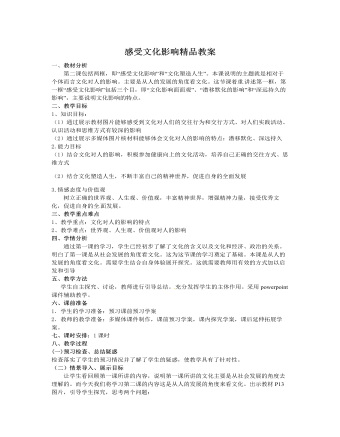
人教版高中政治必修3感受文化影响精品教案
(三)合作探究、精讲点拨 【情景导入,感受文化的影响】用多媒体展示教材“活动探究”P13的内容(图文并茂)情景问题:① 从这两幅画面中发现了哪些文化上的区别?你还能举出更多的事例吗?② 面对我们祖先创造的精美文化产品,人们的感慨,既有差异,又有共同之处。你能否解释这是为什么?(学生讨论、回答)情景问题:让学生阅读“活动探究”情景,带着这些问题去思考、合作、探究,在学生交流、探究的基础上,分组派代表完成这些问题,突出了学生的主体地位。设计意图:1、开门见山的方式引导学生进行新的学习探究活动,创设问题情景,引起悬念,吸引学生的注意力,激发学生的学习兴趣和探究欲望。2、通过自主探究,让学生感悟到道理越辩越明,促使学生存疑、质疑,从而产生强烈的探究欲望。

